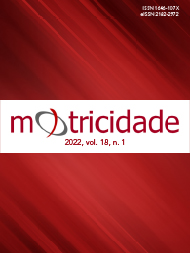Fitness Trends for Portugal 2022
DOI:
https://doi.org/10.6063/motricidade.25847Keywords:
Portugal, Trends, Fitness, ACSMAbstract
The American College of Sports Medicine (ACSM) annually publishes a study of global fitness trends. In 2021, the first study on fitness trends in Portugal was published. The present study reproduced the methodology of the ACSM trends study and characterized the fitness trends in Portugal for 2022. The trends between 2021 and 2022, between genders, between whether to do exercise functions as a professional and between holding the title of Exercise Technician Physical (TEF), Technical Director (DT) or without title, were compared. 758 fitness professionals (FP) responded to an online survey. The main fitness trends for 2022 in Portugal are “Licenses (titles) for FP”, “Employ certified FP”, “Personal trainer”, “Exercise for weight loss” and Healthy lifestyle and behaviour change”. These top 5 trends are the same as those obtained in the study on trends for 2021 in Portugal. When comparing the results of fitness trends 2021 versus 2022, there were significant differences in 17 of the 42 trends. Regarding gender comparison, there were significant differences in 25 of the 42 trends. In the comparison between professionals who exercised functions and those who did not exercise functions as FP there were significant differences in 14 of the 42 trends. In the comparison between professionals with a TEF, DT or untitled title, there were differences in 16 of the 42 trends.
Keywords: Portugal, Trends, Fitness, ACSM
Downloads
Published
Issue
Section
License
The authors of submitted manuscripts must transfer the full copyright to Journal Motricidade / Sílabas Didáticas Editions. Granting copyright permission allows the publication and dissemination of the article in printed or electronic formats, and copyrights start at the moment the manuscript is accepted for publication. It also allows Journal Motricidade to use and commercialise the article in terms of licensing, lending or selling its content to indexation/abstracts databases and other entities.
According to the terms of the Creative Commons licence, authors may reproduce a reasonable number of copies for personal or professional purposes, but without any economic gain. SHERPA/RoMEO allows authors to post a final digital copy (post-printing version) of the article on their websites or on their institutions' scientific repository.


